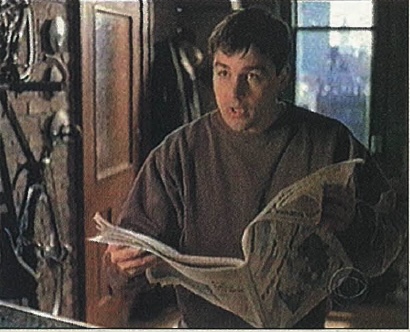In the popular us television series, Early Edition, young Gary Hobson, co-manager of a Chicago bar, mysteriously receives the next day’s newspaper early each morning. Think about it. If you have tomorrow’s news, you know what will happen today. This gives him an overwhelming sense of responsibility. He now has the chance to halt disasters, save lives and otherwise intervene in destiny, which he dutifully does, often aided by bar partner, Chuck Fishman. But the plots are thick, and he usually finds his own destiny intricately woven with those he tries to rescue. And while there is a prudent non-sectarian stance, there is always the supposition that Hobson is being used by some superior cosmic guiding force.
One episode early this year went a bit further and borrowed from Hinduism, hinging an ethical transformation of Fishman on the law of karma. After a typical fateful turn of events, Fishman is deep in trouble, faced with an execution by mob thugs. Hobson and Fishman turn to Crum, a retired police detective who is an earthy former beat-cop. So it is all the more potent and surprising when Crum casually explains to Fishman that all his problems are due to his own karma:
Fishman: Why is this happening to me?
Crum: It’s your karma. Bad things have a way of catching up with you. You reap what you sow.
Fishman: You believe that?
Crum: In your case, absolutely.
Fishman: You can change your karma, right? I mean, by doing a good deed you can make a difference?
Crum: I forgot the rulebook.
At this point, Fishman, desperate for any good karma he can earn, runs out to help a bag lady cross the street. But it seems too late. Caught by the mob, Fishman ends up trapped on a tugboat. Hobson and Crum also become prisoners. A dejected Fishman worries, “Crum says, ‘You reap what you sow.’ If that’s the case, I’d hate to be me at harvest time.”
With no hope for escape and having endangered his friends, Fishman is overcome with the burden of his karma. He confesses to a series of past transgressions which, according to him, reveal his flawed character. He repents, begs forgiveness and vows that if he ever gets out of this mess, he will change his ways forever.
They escape, barely, and Fishman later learns that the bag lady he helped was actually a department store heiress millionaire. Convinced that he is a decent man, she gives him $100,000. True to his vow, Fishman decides to leave the bar in order to put the money to use for the benefit of others. His life has been forever transformed by understanding the law of karma. We may never see him again…but that’s our karma.


